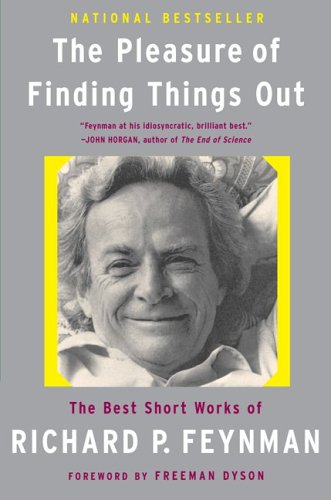Books, Brochures, and Chapters>Book Chapter: Feynman, Richard (1988), The Value of Science from What Do You Care What Other People Think?: Further Adventures of a Curious Character, W.W. Norton and Company, Retrieved on 2010-11-13
Memes
03 JAN 2011
 Our Responsibility as Scientists
Our Responsibility as Scientists
We are at the very beginning of time for the human race. It is not unreasonable that we grapple with problems. There are tens of thousands of years in the future. Our responsibility is to do what we can, learn what we can, improve the solutions and pass them on. It is our responsibility to leave the men of the future a free hand. In the impetuous youth of humanity, we can make grave errors that can stunt our growth for a long time. This we will do if we say we have the answers now, so young a...We must leave the door open to speculation, and never declare that we have it all figured out, because that would doom future generations.
03 JAN 2011
 The Dream is to Find an Open Channel
The Dream is to Find an Open Channel
Through all the ages men have tried to fathom the meaning of life. They have realized that if some direction or meaning could be given to our actions, great human forces would be unleashed. So, very many answers must have been given to the question of the meaning of it all. But they have been of all different sorts, and the proponents of one answer have looked with horror at the actions of the believers in another. Horror, because from a disagreeing point of view all the great potentialities ...Leaving the door open, understanding that we are perpetually figuring it all out, and this understanding motivated the founding fathers in formulating democracy.
03 JAN 2011
 Doubt as a Scientific Virtue
Doubt as a Scientific Virtue
I would now like to turn to a third value that science has. It is a little more indirect, but not much. The scientist has a lot of experience with ignorance and doubt and uncertainty, and this experience is of very great importance, I think. When a scientist doesn't now the answer to a problem, he is ignorant. When he as a hunch as to what the result is, he is uncertain. And when he is pretty darn sure of what the result is going to be, he is in some doubt. We have found it of paramount impor...Folksonomies: science scientific virtues
Folksonomies: science scientific virtues
The importance of doubt, and a lack of absolute certainty, in science, which is non-authoritarian.
03 JAN 2011
 Reading the Music of Science
Reading the Music of Science
Is nobody inspired by our present picture of the universe? The value of science remains unsung by singers, so you are reduced to hearing--not a song or a poem, but an evening lecture about it. This is not yet a scientific age.
Perhaps one of the reasons is that you have to know how to read the music. For instance, the scientific, article says, perhaps, something like this: "The radioactive phosphorus content of the cerebrum of a rat decreases to one-half in the period of two weeks." Now, what...Folksonomies: science ionian echantment
Folksonomies: science ionian echantment
People aren't amazed by scientific discovery because, maybe, they don't understand it.
03 JAN 2011
 Why Scientists Don't Tackle Social Problems
Why Scientists Don't Tackle Social Problems
From time to time, people suggest to me that scientists ought to give more consideration to social problems--especially that they should be more responsible in considering the impact of science upon society. This same suggestion must be made to many other scientists, and it seems to be generally believed that if the scientists would only look at these very difficult social problems and not spend so much time fooling with the less vital scientific ones, great success would come of it.
It seems...Scientists are as dumb as anyone else at tackling non-scientific problems, that's why they stick to science.
03 JAN 2011
 The Importance of Enjoying Science
The Importance of Enjoying Science
Another value of science is the fun called intellectual enjoyment which some people get from reading and learning and thinking about it, and which others get from working in it. This is a very real and important point and one which is not considered enough by those who tell us it is our social responsibility to reflect on the impact of science on society.
Is this mere personal enjoyment of value to society as a whole? No! But it is also a responsibility to consider the value of society itself...While the personal enjoyment does not contribute to society, expressing this enjoyment, organizing it for others to enjoy benefits society.
Parent Reference

Books, Brochures, and Chapters>Book: Feynman, Richard and Robbins, Jeffrey (1999), The Pleasure of Finding Things Out, MJF Books, New York, NY 10001, Retrieved on 2010-11-07
Folksonomies: enlightenment science 



